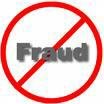Vigilantism on eBay ... Two Wrongs Do Not Make it Right
We are sure that you have seen some eBay listings with outrageously high bids on them. Often these high bids are the result of vigilantes seeking justice on fraudulent listings, trying to prevent unsuspecting bidders from bidding.
Although we applaud the vigilantes motives, two wrongs do not make it right. Vigilante bidding is an eBay violation and is subject to loss of eBay membership.
We would like to bring some information to the attention of the vigilante bidders, as there may be possible repercussions they are unaware of.
You may not realize this, but if eBay does not cancel a listing (also known as TKO) in time, you have entered into a legally binding agreement to buy the item you won. You may not care, but that's the truth.
More importantly, if the fraudulent listing is not caught in time and not TKO'd by eBay, then the true account holder is going to be billed for the listing and final value fees. You don't know which members are on which eBay billing cycles. If the fraudulent listing completes and a billing cycle occurs, the true account holder will be billed by eBay and hit for these charges on a credit card, through a direct payment withdrawal through PayPal or through a designated bank account.
Vigilante bidders cause these charges to occur, and subject the true account holder to additional grief and aggravation, causing the true account holder further financial harm. If there are insufficient funds in a bank account to cover the eBay charges, you very well may cause the true account holder to be billed for additional charges such as overdraft fees on their bank accounts. Not everyone has overdraft protection on their bank accounts. Whether you realize this or not, not everyone has extra money in their bank accounts to cover eBay fees that they did not plan on being charged for. If funds are withdrawn from a bank account because of an eBay bill, this may cause a trickle down effect and cause other authorized withdrawals to bounce on a bank account.
When the charges incurred for fraudulent activity are brought to eBay's attention, it will refund the fees to the person that was harmed, however, the person's bank and other creditors aren't going to care. The bank is not going to refund the service charges for insufficient funds. And, to top it off you will be causing additional harm by unnecessarily putting a black mark on someone's credit rating. Do you really want the victim of a hijacked account to be subject to further aggravation and have to go through hoops and contact his/her creditors and the credit rating reporting agencies to clear up these black marks on their records that you have caused?
Vigilantes, before you bid look at the broader picture. Realize that although you may be trying to protect an innocent bidder from being scammed, you may be causing more harm than good and really be victimizing the person that was hijacked.
Team Whack a Hack and The Nekkid Truth are asking the vigilante bidders to stop bidding and instead report the hijacked accounts via webform or directly to eBay's Live Help Team for resolution.




2 comments:
Hi
I read your post on 'Vigilante Bidding' with great interest. I recently tried to discuss this issue via a posting on E-bay Answers. The responses I received were very dogmatic, and in most instances offered little beyond the scope of the E-bay rule book, which seems to be a bible to some. As you have obviously giving the ‘Vigilante Bidding’ question much more thought, I’d like to share my experience with you, and ask for your thoughts on my actions.
Before I go on, I would like to explain my situation. On the 24 March, I was browsing E-bay looking for a laptop. I noticed two accounts which were almost certainly hijacked by the same person. I reported these suspicious listings to E-bay. The auctions were close to ending, so I put them on watch, so that I could advise the winners of the auctions against paying. I was able to do this for one of the winners, who offered the seller payment as cash on collection. Naturally, the ‘seller’ declined this offer. I was not able to contact the other bidder as E-bay blocked the contact.
Out of curiosity, I decided to see if E-bay had got round to closing these accounts yet (they say they will respond in 24 hours). They hadn’t. I reported this again to E-bay. I noticed that the sellers accounts had four laptops listed as ‘Buy-It-Now’. By now, some additional fake positive feedback had been added from other hijacked accounts. This was to counter some negative feedback left by two other buyers who were wise enough not to pay when the buyer insisted on bank transfers instead of Paypal (not listed as an option in the listings) or cash.
At this time, I thought, hey, a crime is in progress, and I could stop it by bidding on the items, and leaving negative feedback. I initially tried to set up another account to do this, but ended up using my regular account in the end. I realized I would get some bad feedback from the hijacked sellers accounts, but was not overly concerned by this. I have reported these accounts again since.
As is stands today, I have been contacted by other E-bays who have either (a) bid, and decided not to pay after reading my feedback comments (b) have purchased items from these sellers (and not received goods). In the latter case, so far these are people who won auctions before I took my ‘vigilante’ action. I think more contact from scammed buyers over the next few days is inevitable.
I’d like to use my experience to address two of the points you raised:
(1) An E-bay bid / ‘Buy-It-Now’ is legally binding
I think in this instance you are incorrect. First, let’s assume the goods do not exist. In this case, there can be no contract in existence, as there are no goods. The whole auction is an attempt to defraud. The fact that fraud is illegal means no contract exists. Of course, for this argument to be valid, you must be 100% certain that the auction was a fraud. E-bay may tell you that you have a legally binding contract, but E-bay do not write the laws governing any country that I am aware of. At most, you have violated E-bay policy. Maybe your account will become ‘NARU’ at worst. Next, we must consider that thousands on E-bay ‘contracts’ (if we can call them that) are made and broken every day. Often, this is by people who bid for an item, then decide not to pay for whatever reason. Of course, this is irritating for the genuine seller, but they can reclaim their fees and relist. There is not much point in trying to enforce the E-bay ‘contract’. In the EU, everyone has the right to return goods purchased via distance selling contracts within two weeks for any reason whatsoever. Therefore, if you change your mind and do not proceed with a ‘Buy-It-Now’ purchase, it is perfectly legal. The German Supreme Court have decided that E-bay auctions are also subject to this distance selling law http://www.out-law.com/page-5038. I’m no expert, but I think this will ruling will be persuasive or binding in most other courts in the EU. So again, whatever the motives for non-payment, it violates only E-bay policy.
(2) Your second argument I think is that you could cause some financial harm to the legitimate owner of the hijacked bank account in terms of listing fees. These fees will be returned to the owner when it eventually dawns on E-bay that the accounts are hijacked. You correctly pointed out that the true owner of the account may then face additional bank fees, and the nightmare of having to correct their credit file. I think you raised some very good points here, but in my mind this is something of a grey area. I’d certainly like to hear other people’s thoughts on this, or perhaps instances where owners of hijacked accounts have experienced this. I’m not sure myself how this all weighs up. One could argue that the E-bay fees to the true account owner are inevitable, and they will have much better success in receiving money back that many of the buyers who get scammed.
To end, I’d like to conclude that
(a) my vigilante bidding actions were only partially successful. The accounts are still open, and people are still being scammed out on considerable amounts of money. I’ve probably put a lot of people of bidding though.
(b) E-bays inaction in this instance is disgraceful. They were provided with the necessary information to close these accounts 12 days ago. In fact, I think they should have been able to spot these fraudulent accounts earlier for a number of reasons I’ll not discuss further. Vigilante bidding would not be necessary if E-bay dedicated sufficient resources to react to fraudulent activity reports within a reasonable timeframe.
(c) E-bay policies are just policies. If broken, your account may get closed. E-bay exists to make money for its shareholders. This is the primary function of all companies. The extent to which their policies and actions (or inactions) prevent either buyers or sellers is an open question.
(d) Clichés (two wrongs don’t make a right) might make nice headlines, but can be used to support almost any argument – vigilante bidders might use (the end justifies the means)
ak, I appreciate your well thought out comments, however, for our discussion here, I am solely talking about vigilante bidding on hijacked accounts.
If you bid on a fraudulent listing on an account that has been hijacked, eBay will eventually TKO the (nullify)listing. Feedback left for that listing will be removed, therefore, you are not warning or protecting anyone. It serves no purpose to leave negative feedback for on an innocent member's account that was hijacked for a thief.
Vigilante bidding is an offense that eBay does take seriously. If your account is NARU'd by eBay for this reason, or any other reason, you are not to use any other established eBay accounts or create any new ones. You can appeal eBay's decision, but, most likely, you will not win the appeal.
The correct process for reporting a hijacked account, or an account created for the intent to defraud is to report the account via eBay's webform. If you find that eBay has not taken action to the webform you submitted, then you should report the account to eBay's Live Help group that is responsible for fraud.
Please realize that hijackers most frequently put up listings to make off-eBay contact. They normally do not want to be paid via PayPal, check or money order. They do not care if their listings complete or not, however, the longer the listings are active, the longer the thieves have the opportunity to entice and defraud more members.
Thanks for your comments. I appreciate that you want to combat fraud on eBay, but I hope that you will combat fraud by following eBay's procedures and warning everyone you know that they must take every precaution possible if they are going to enter into eBay transactions. Buyers have no protection if they enter into off-eBay transactions or if they pay via unsafe payment methods, such as instant money transfer services.
Post a Comment